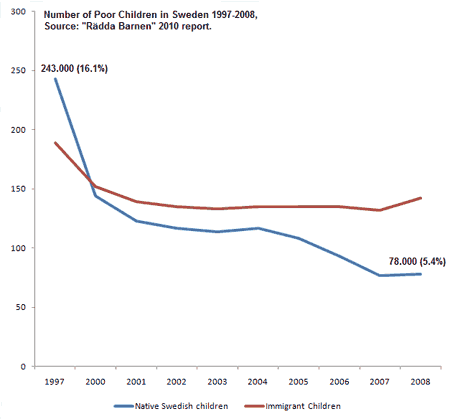Yesterday Håkan Juholt, the new leaders of the Social Democratic party, gave his opening speech to the party congress where he outlined the future direction of policies.
Juholts chief identified social problem and number one priority was child poverty. He stated:
“We will not be a country where several hundred thousand children live in child-poverty. It is a shame for Sweden…It only belongs in [conservative leader] Reinfeldt’s Sweden, not in Social Democratic Sweden”.
Child poverty is measured by non-profit group “Rädda Barnen”, and is defined as either children in families who receive welfare (“socialbidrag”) because they are below the poverty norm defined by the state, or children in families who live below the poverty norm but for various reasons do not receive welfare. I would therefore have been counted among the sample of poor children between 1989-1999 when we lived on welfare.
It is therefore a reasonable measure that approximates absolute child poverty (although welfare payments and these minimum norms increase slightly over time in real terms).
The standard critique of the right is that these measures are relative poverty which can give misleading results. For example with relative poverty the poverty rate could bizarrely rise even if when the real income of the poor increases, just as long as the real income of the rich increases even faster. However this critique is not valid here, since the measure is closer to absolute poverty. This is incidentally also true of the American poverty rate, which contrary to perception among many libertarians measures absolute poverty, not relative poverty.
First, let’s note that child poverty has declined. In 1997 there were 432.000 poor children in Sweden, and in 2008 the number was 220.000 (so Juholt was technically wrong when he said “several” hundred thousand, but let’s not be picky). In percentage terms child poverty went from 22.3% to 11.5%.
But Sweden has experienced rapid income growth in the last decade and a half. So why isn’t child poverty declining more? Surely it must be due to the heartless neo-liberal policies of the right!
I think this graph can give us some a hint of what’s going on.

In 2008 the child poverty rate of Native Swedish children was only one third of what is was in 1997, a massive reduction from 243.000 to 78.000. The only reason Sweden’s’ total child poverty rate has not declined more is that during these years politicians to the right and the left brought several hundred thousand poor immigrants to Sweden to swell the ranks of the impoverished. While first and second generation immigrants constituted 44% of the poor children in 1997, they were 65% of all poor children in Sweden in 2008.
Only 5% of native Swedish children live in poverty. For immigrant children with both parents born outside of the Sweden, the child poverty rate is 39%, a miserable number which may shock and should dishearten liberal Americans. The Swedish model appeared to produce amazing results as long as the country was completely homogeneous and full of Swedes. But the much admired welfare state was unable to deal with even moderate levels of ethic diversity (still far below the levels of the United States) without a collapse in social outcomes.
Demographic change, not economic policy, is what is preventing child poverty from declining (if it were the fault of economic policy the child poverty rate of ordinary Swedes would not have declined so much).
The leader of the Social Democrats said “Child poverty shall be combated every day and with all available means!”
One fool-proof method would be slowing the importation of tens of thousands of more poor people every year until he has solved child poverty among Swedes and immigrants already here. I am guessing however that this is not among theoretically possible “available means” in Mr. Juholt’s universe.



Leave a Reply